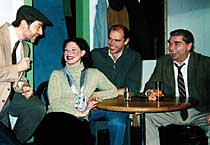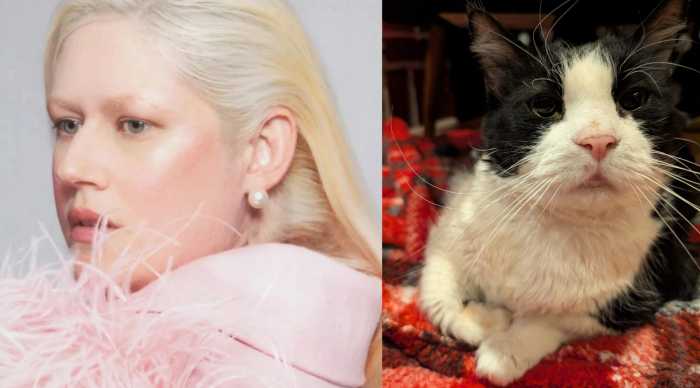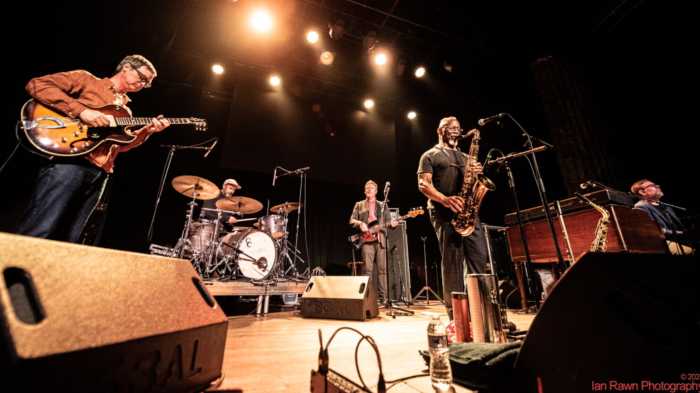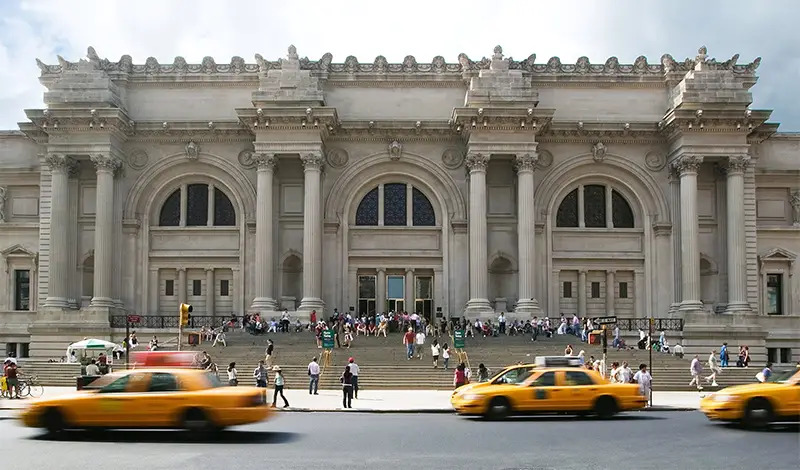Connor McPherson’s "The Weir,"
with its spine-tingling ghost stories told in a rural Irish pub,
allows the Gallery Players to show off what they do best – provide
top-notch acting and create a masterful, realistic set.
Set designer Todd M. Reemtsma has recreated a typical Irish pub
that’s perfect down to the lace window curtains and Irish flag
beneath the television. And Heather Siobhan Curran directs a
top-notch cast that makes the spoken word a joy to hear.
And that is especially important here, as Curran makes a valiant
effort to keep her actors moving in a play that basically has
no action, or plot. The cast has mastered the Irish accent and
Gaelic mannerisms so well they might well have kissed the Blarney
Stone. But there is probably nothing that can be done with McPherson’s
work to make it into a play.
"The Weir" is about four pub regulars: Jim (Joshua
Bevans), Brendan (Patrick Toon), Finbar (Mike Durkin) and Jack
(John Blaylock, having grown a beard and shed the English accent
he is so often called upon to use in Gallery Players productions),
who regularly pass the time and quench their thirst at a local
pub, in an isolated town where there really isn’t much else to
do.
When Finbar, a wealthy businessman and property owner, brings
over a woman named Valerie (Brooke Delaney), who has just bought
a house from him, the men exchange their idle gossip and harmless
barrage of insults for the telling of tall tales.
They do this with an eloquence, a sense of foreboding and an
evocation of the magical and mysterious that have made the Irish
among the best authors of the English language (as any Irishman
will tell you).
Jack, an aging bachelor, tells a story about a house (the very
one Valerie has just bought) that was constructed on a route
used by fairies. Finbar relates a scary story about a strange
woman he saw at the top of a staircase. Finally, Jim timidly
tells of how, when digging a grave, he met the man who was destined
for it.
But it is Valerie who has the most frightening and heart-rending
story of all. And it is her story that brings out the compassion,
friendship and common decency in all four men.
In an exceedingly laudatory review, Fergus McGillicuddy called
the London production of "The Weir," "a darkly
magical, lyrical little play with no plot to speak of beyond
the transforming effects of the spoken word."
Apparently he didn’t mind this lack of plot. Neither did the
respondents to The Royal National Theatre’s survey who voted
"The Weir" one of the most significant plays of the
20th century, nor the London Evening Standard, which gave McPherson
its Most Promising Playwright award. And when the production
moved to a theater on England’s West End, it won the 1999 Olivier
Award for Best New Play.
But this reviewer did mind. And, possibly, American audiences
did, too. "The Weir" opened at the Walter Kerr Theatre
on April 1, 1999 and closed seven months later, after 277 performances.
Not exactly a stellar run.
A weir is a dam, and a dam can either hold water or let it come
forth, sometimes as a powerful flood. In McPherson’s play the
weir metaphorically breaks and lets loose a flood of words that
sets free the emotions each storyteller has kept bottled up –
sometimes for years.
But after the stories are over, as beautifully rendered as they
are, one does not get the feeling that much has changed. No new
decisions have been made, no old ones broken. No one has changed
his mind or resolved to take new steps. There’s a touch of regret,
a bit of advice and everyone leaves to go home.
Perhaps at a time when we are saturated with the meaningless
dialogue of television sitcoms and blockbuster movies, when films
can sweep the Academy Awards without garnering a single award
for acting, many may think it enough for a play to have good
dialogue delivered well and with feeling.
But we have a right to demand more of our playwrights. We have
a right to demand vision. We have a right to demand movement.
We have a right to demand problems, and alternatives if not solutions.
"The Weir" is a wonderfully executed production. It
is a sheer pleasure to watch every one of these talented actors.
But at the end of the play, one may wish they were given a little
more to say.
The Gallery Players production of "The
Weir" runs through April 11: Thursday through Saturday,
at 8 pm and Sunday, at 3 pm. Tickets are $15, $12 seniors and
children under 12. The Gallery Players are located at 199 14th
St. between Fourth and Fifth avenues in Park Slope. For more
information, call (718) 595-0547 or visit www.galleryplayers.com.

























